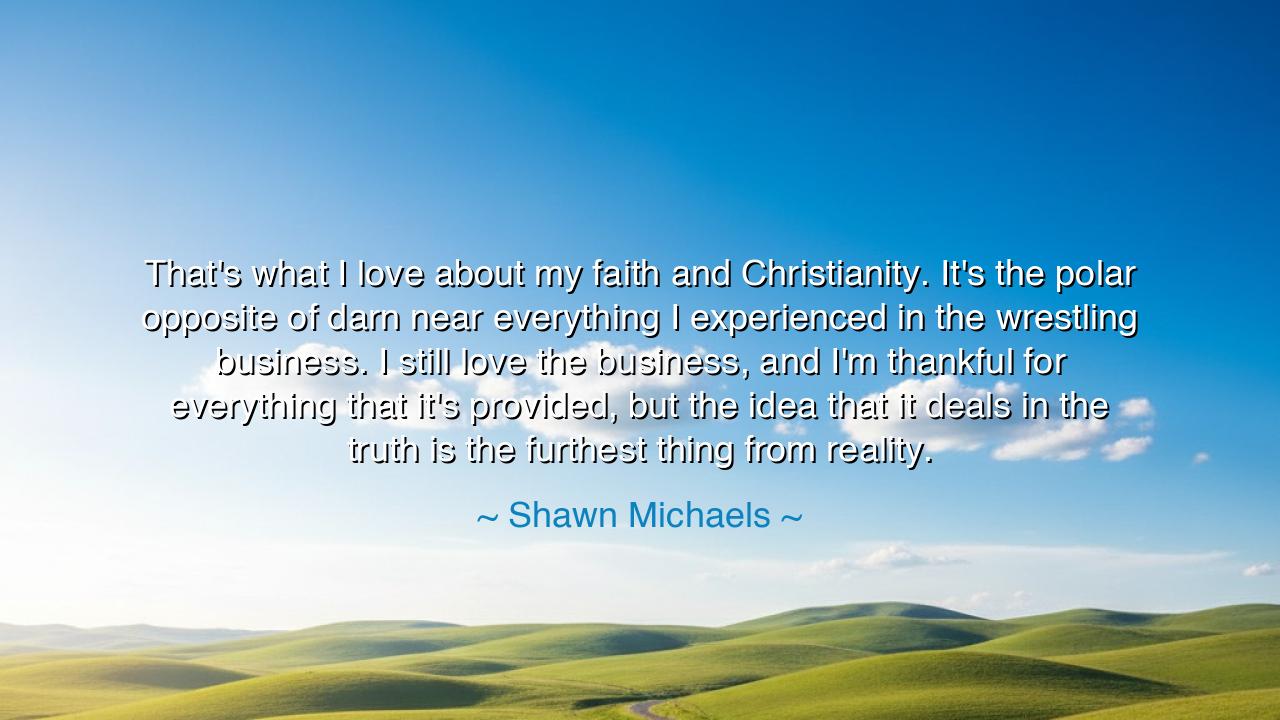
That's what I love about my faith and Christianity. It's the
That's what I love about my faith and Christianity. It's the polar opposite of darn near everything I experienced in the wrestling business. I still love the business, and I'm thankful for everything that it's provided, but the idea that it deals in the truth is the furthest thing from reality.






In the words of Shawn Michaels, the wrestler who once lived in the glare of lights and the roar of crowds, we encounter a contrast that is as old as the human soul: the struggle between illusion and truth, between the fleeting glory of the arena and the enduring peace of faith. He speaks of Christianity as the "polar opposite" of his wrestling life, and this statement is not one of disdain, but of awakening. For though he still honors the wrestling business, calling it a gift that provided much, he also unveils the veil of performance, reminding us that such a world deals not in truth, but in the shimmer of spectacle.
To understand him, one must first understand the wrestling stage. It is a theater of combat, where strength is displayed, but stories are woven with deception and script. Heroes and villains are created, victories are arranged, and drama is crafted to stir the hearts of spectators. It is not reality, but a mirror of it—grand, exaggerated, and false. Michaels, who once bore the name "The Heartbreak Kid," was both master and prisoner of this illusion. His words reveal the wisdom that comes from years of living in such a realm, where truth bends and masks are worn daily.
Yet into this world of shadows entered the light of faith. In Christianity, Michaels found not a stage of shifting tales, but a firm ground of truth. For the faith he embraced did not deal in illusion but in eternal things: forgiveness, redemption, humility, and love. He contrasts the falseness of wrestling’s stories with the unyielding truth of Christ’s words, which are not written for spectacle, but for salvation. The emotional force of his testimony is clear: he has moved from a world where nothing is as it seems, into a realm where truth is unchanging and eternal.
We find echoes of this in history. Consider the tale of St. Augustine, who in his youth chased after the pleasures and illusions of the world—fame, lust, and intellectual pride. Yet he too came to despise the falseness of those pursuits, for they never satisfied the hunger of his soul. Only when he surrendered to the truth of God did he find peace. Just as Augustine left behind the stage of worldly illusion, so too did Michaels, though his arena was a ring of combat rather than the courts of philosophy. Both men teach us that truth is not found in the applause of the crowd, but in the quiet embrace of the eternal.
The lesson here is profound. Many of us dwell, knowingly or not, in arenas of illusion. Whether in careers, social circles, or the endless pursuit of recognition, we may find ourselves playing roles, crafting images, and living by half-truths. Yet, as Michaels reminds us, there comes a time when we must measure the worth of these illusions against the unshakable reality of truth. And truth, though harder to bear, sets the soul free.
Therefore, let the teaching be this: honor the stages upon which you once stood, but do not mistake them for life itself. Be thankful for what they gave you, as Michaels was thankful for wrestling, but do not chain your spirit to them. Seek instead the truths that endure—whether in faith, in love, in virtue, or in the honest labor of your heart. For only these things bring rest to the weary and peace to the restless.
In your daily life, practice discernment. Ask yourself: “Am I living in truth, or am I caught in illusion?” Step away from the masks that others demand you wear. Speak words that are honest, even when they cost you comfort. Pursue practices of reflection—through prayer, meditation, or study—that anchor you to the eternal. Like Michaels, dare to walk away from falsehood into the arms of what is real.
And so the wisdom of Shawn Michaels resounds across time: that the arenas of spectacle will fade, but the truth of faith endures forever. Let us carry this teaching not as distant words, but as a living fire in our own lives—so that when the lights dim and the crowd disperses, our souls may still stand firm upon the rock of truth.






AAdministratorAdministrator
Welcome, honored guests. Please leave a comment, we will respond soon